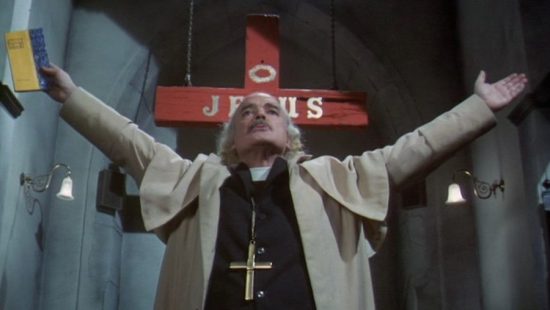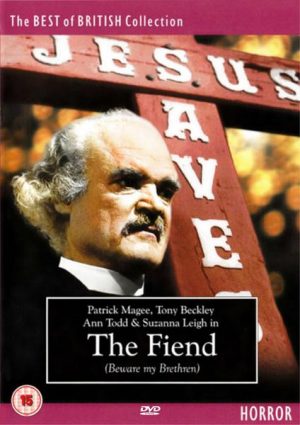 Distributor: Odeon Entertainment
Distributor: Odeon Entertainment
DVD Release Date: 7th March 2011
Directed by: Robert Hartford-Davis
Starring: Patrick Magee, Tony Beckley, Ann Todd, Suzanna Leigh
Review by: Ben Bussey
A small congregation sits in a crumbling suburban church. All clad in garments drab and dirty enough to have stepped directly out of a Charles Dickens novel, they are hysterical in their repentance, obsessed with finding salvation, and quite clearly functioning on a low level of mental health. Their domineering minister preaches the usual; sin, hellfire, eternal damnation and the like, and his subjects willingly cower under his thumb. It’s a sorry sight to say the least; but when they burst into song, it’s a remarkable sound. The hymn is akin to a gospel-flavoured power ballad, and the congregation hit their notes and harmonise as well as any Motown band. And intercut with this, we see a terrified young woman running for her life through the dark back streets of swinging London, before an unseen assailant grabs her, drowns her in the Thames, strips her corpse and leaves her floating in the water in a notably cruciform pose.
So begins one of the most fascinating, unconventional British horror films of the early 70s which, until watching it for this review, I had never even heard of.
I’m not entirely sure why Odeon Entertainment opted to go with the title The Fiend for this DVD; Beware My Brethren is the title used in the film itself and the accompanying trailer (the only extra, along with an Odeon Entertainment trailer reel). Beware My Brethren would also seem the more appropriate title, given its obvious allusions to the film’s religious themes. Unsurprisingly, however, it was that very religious element that got the film in a spot of hot water on release, resulting in cuts which have been restored here for the first time. As such, the sleeve notes say, most of the people involved in this film would rather forget it, regarding it a rather shameful entry on their CV. It’s too bad that actors and filmmakers sometimes feel that way about films which genuinely challenge the audience and push the boundaries. For that is just what this film does, and it really holds up today.
 In stark contrast to the supernaturalism of Hammer and Amicus which, in the UK at least, still dominated the genre in the early 70s, The Fiend plays out in a more kitchen sink reality. Tony Beckley is Kenny, presumably the Fiend to whom the title refers; a grown man who still lives with his mother (Ann Todd), not only living according to the rules of their little church but literally living in the church itself. It is immediately apparent that this arrangement is less than healthy, and is clearly contributing to Kenny’s fragile state of mind. Having spent his life being force-fed puritan ethics by a domineering matriach, Kenny is now compelled to bring down the wrath of God on the sinful; or, more specifically, pretty young women of loose morals. Yes, this guy beat Jason Voorhees to the punch bowl by a good nine years. Indeed, along with the notorious Peeping Tom and the lesser-known Hammer film Hands of the Ripper (plus that certain black and white flick with Janet Leigh, which was of course directed by a Brit), this film could lend some weight to an argument that Britain invented the slasher genre.
In stark contrast to the supernaturalism of Hammer and Amicus which, in the UK at least, still dominated the genre in the early 70s, The Fiend plays out in a more kitchen sink reality. Tony Beckley is Kenny, presumably the Fiend to whom the title refers; a grown man who still lives with his mother (Ann Todd), not only living according to the rules of their little church but literally living in the church itself. It is immediately apparent that this arrangement is less than healthy, and is clearly contributing to Kenny’s fragile state of mind. Having spent his life being force-fed puritan ethics by a domineering matriach, Kenny is now compelled to bring down the wrath of God on the sinful; or, more specifically, pretty young women of loose morals. Yes, this guy beat Jason Voorhees to the punch bowl by a good nine years. Indeed, along with the notorious Peeping Tom and the lesser-known Hammer film Hands of the Ripper (plus that certain black and white flick with Janet Leigh, which was of course directed by a Brit), this film could lend some weight to an argument that Britain invented the slasher genre.
But is it necessarily Kenny who is the Fiend – might it not be the Minister played by Patrick Magee? A really nice bit of understated menace, Magee plays it totally straight, helping to anchor this arch melodrama in some sembelance of social realism. While the brethren portrayed here is clearly a caricature, there can be no question that such fanatical and desperate congregations do exist, and so too do such megalomaniacal figures as this Minister.
Less effective are the supporting characters. Suzanna Leigh (who I primarily know as the foxy school teacher in Lust For A Vampire) is an investigative journalist whose ditrict nurse sister, played by Madeleine Hinde, happens to care for Kenny’s mother. At her sister’s insistence, she plots to infiltrate the brethren and publish an expose on their dangerous ways. Clearly designed as hip and groovy chicks for the young audience of the day to relate to (they’ve even got the word ‘Gear’ plastered on the wall of their swinger’s pad), they’re almost as laughably anachronistic as Stephanie Beacham and co. in Dracula AD 1972. Predictably most of Kenny’s victims don’t fare much better, all coming across as deficient in common sense and overly eager to take their clothes off.
Still, The Fiend is a film of considerable power and atmosphere that is clearly atypical of its era. The mission statement of Odeon Entertainment’s Best of British line is “to release some of the forgotten classics from the Golden Age of British Cinema.” Whilst it may be debatable as to whether for Britain the early 70s really was all that golden an age, I’d say forgotten classic is a very applicable label to The Fiend. Here’s hoping this DVD release goes some way to changing that.